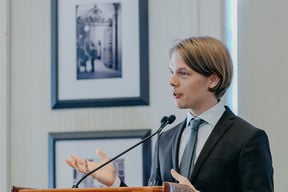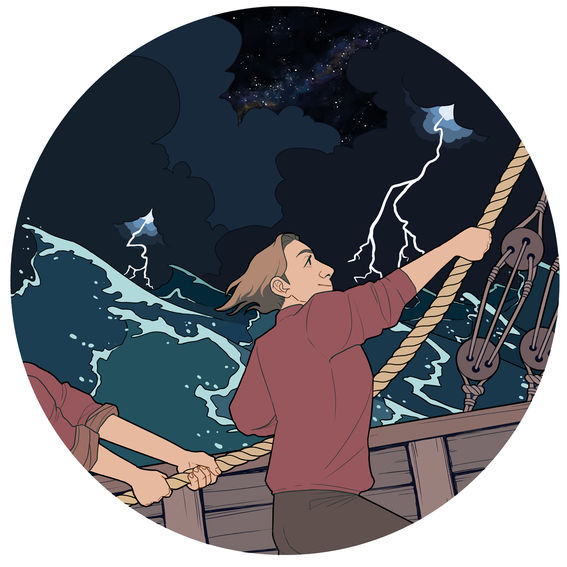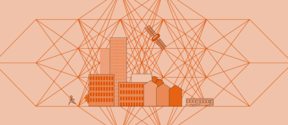Lauri Pietinalho wrote his doctoral thesis following the footsteps of Nobelist Edmund Phelps

What do you research and why?
Initially I started to ponder the “mass flourishing” theory of Edmund Phelps, a winner of the Nobel Prize in economics, which is discussed in two essays of the dissertation. In his view, venturing into the unknown, challenging oneself, and learning in an environment that is constantly changing, are central to human life. Phelps’s work is based on contrasting the dynamism involved in the emergence of Western modern economies to the preceding traditional social order valuing conformism and predictability.
In my dissertation I do not consider dynamism in terms of certain economic systems as such. Instead, I examine the human agency involved in Phelpsian mass flourishing from the point of view of phenomenology and organizational logic, emphasizing the internal experience of the individual. When opening toward something that does not yet exist, a significant part of the experience is not to visualise a specific reward or an outcome for the ego. It arises from a certain trust in life. The phenomenon of trust in life does not boil down to verification - instead, it aims toward opening which always points beyond what can be grasped intellectually. This phenomenon is central, I believe, in dynamics of renewal and emergence.
Centrally, I theorise that this kind of trust in life is nourished by experiences of, what I denote as, a “sense of expansiveness.” We might be encountered in a way that allows us to be seen in a new way that expands how we feel about life itself. Similarly, if we succeed in encountering someone else in such a meaningful way, also our own sense of the depth and breadth of life is often renewed and expanded. A third way in which a sense of expansiveness may emerge is when we succeed in creating in a way that opens something outside of ourselves in the real world, leading to confidence in the expansiveness of life. Finally, the environment in which we live might be undergoing a phase of a more general qualitative expansiveness that influences our sense of the nature of reality.

In two other essays of the dissertation, I consider the same core phenomenon from a wholly different angle, by examining authority paradoxes in formally hierarchical companies that are experienced as non-hierarchical. That is, how is it possible for an enterprise to have a responsible management - CEO and owners - while the operating model remains largely dispersed, in which each person has the possibility, in principle, to decide on how to conduct their affairs? In these companies, I was particularly interested in the organisational sense of expansiveness that such paradoxes seemed to engender.
Finally, I combine the phenomenological with the organisational analysis. Trust in life is a necessary component in all true innovation, but also in constructive collaboration within an organisation. I argue that internally no particular organisational structure, culture, or practice, per se, serve a sense of expansiveness but how those come to open an unexplored space in established ways of doing things. I conclude that for the experience of expansiveness to be maintained, ultimately an organisation must have “feeds” for it from outside of the organisation. I distinguish organisational archetypes that enable such feeds.
How did you become a researcher?
Already when I was writing my master's thesis, and later as a strategy consultant, I was interested in the principles governing the dynamics of organisations and the economy, whose understanding would be beneficial with the key challenges of capitalism. I wanted to do something more abstract in this area and I ran into the work of Edmund Phelps, which resonated with me. Through my doctoral supervisor, Professor Esa Saarinen, I was able to contact Phelps, and I began my dissertation research with a three-month visit to his research center in New York. Since then, he has been a strongly supportive background mentor for my project.
What are your future expectations?
I expect to continue working with these phenomena. I have been invited to further develop my theorisation as a post-doctoral research fellow at the Stern School of Business at New York University. As my opponent hoped, I also seek to convert some of the key conceptualizations in my work into everyday language in a way that is relevant to organisations.
Because of the coronavirus pandemic, only a handful of people attended the defence of the dissertation, though quite a few followed it through Zoom. I have not held a post-doctoral party yet. Hopefully, its time will come soon!
Further information:
- Published:
- Updated:
Read more news

Get to know us: Associate Professor Maria Sammalkorpi
Sammalkorpi received her doctorate from Helsinki University of Technology 2004. After her defence, she has worked as a researcher at the Universities of Princeton, Yale and Aalto.
Aalto computer scientists in ICML 2024
Computer scientists in ICML 2024
Getting bacteria into line
Physicists use magnetic fields to manipulate bacterial behaviour